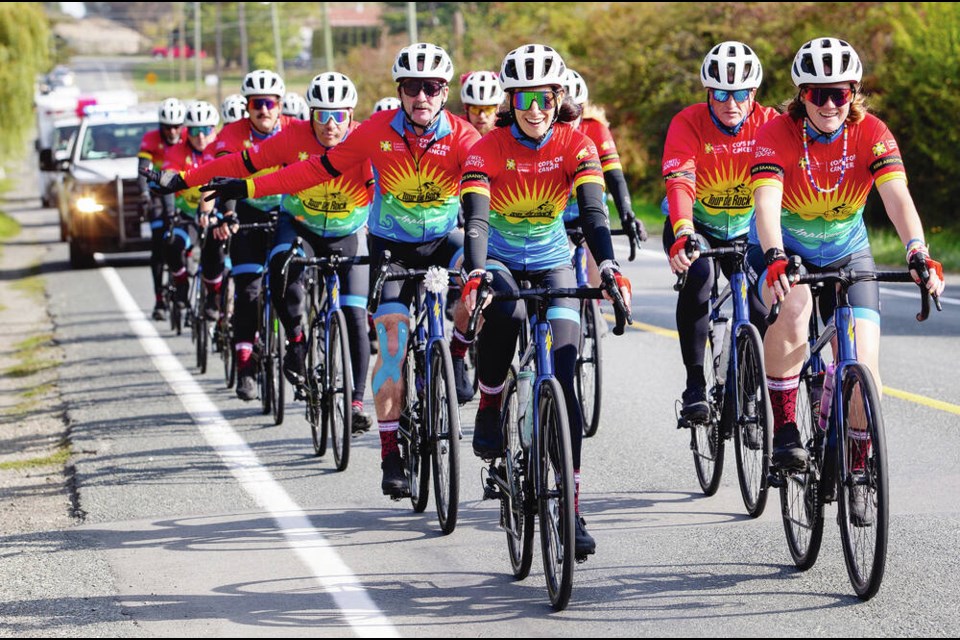We’re riding the rolling hills of Sooke Road and my Tour de Rock teammate is yelling at me to look behind because some of our riders have fallen back on an uphill section.
“I can’t see that far!” I yell back. “If there’s a gap, someone needs to tell me. I can’t just know that!” Almost immediately, I feel bad about my snippy response. When we rotate and I line up with her again, I apologize for snapping at her.
“No, I snapped at you,” she says, and we both laugh.
After a long day in the saddle, riding about 90 kilometres up and over the Malahat while fighting a headwind heading into Langford and Sooke, some of us (OK, me) are feeling cranky.
I take an informal poll on Wednesday night of who thinks they’ve hit their crankiest point of our two-week Tour de Rock ride, which is raising money to fund pediatric cancer research and programs that help children and their families, such as Camp Goodtimes.
Several hands go up.
We’re tired in every sense of the word. “My soul is tired,” as one teammate puts it.
It’s been a long day on top of 11 long days, and for many of us, riding into Greater Victoria brings us into home territory. I can almost taste my own bed and a quiet moment to myself as we race down the Malahat.
We fight through the fatigue and pull ourselves together for a casino-themed fundraiser in Sooke, where we’re reminded why we’re pushing our bodies, minds and hearts to their limits to cycle more than 1,000 kilometres on the Island.
During dinner in Sooke, Kyla Hugli, a cancer survivor, raises enough money to meet her $5,000 goal to shave her head. It’s a bit of a full-circle moment for her, she tells me.
Hugli was involved with Tour de Rock for several years after she was diagnosed with bone cancer at 12 in 2004, and she reconnected with the team this year to celebrate 20 years cancer-free. Hugli lost her hair as a child after months of chemotherapy, which made her feel nervous and insecure as a pre-teen. She wore bandanas and hats to cover up in public.
Her bare head back then was a reminder that she was sick, she says.
This time, it feels like a privilege to remove her hair, Hugli tells me after shaving her head on stage. She calls herself “one of the lucky kids” because she survived.
None of the friends she made during treatment made it and her head shave is for them and for those who are still in the thick of it, she says.
Twenty years after she got sick, more children are surviving a cancer diagnosis, “and it’s not possible without the whole community coming together and raising all the money that they do,” Hugli says.
She chose to shave her head to show children who are sick with cancer that there’s a community behind them. That’s what being part of Tour de Rock did for her as a child.
“For us kids, the riders are like our heroes. That’s how we look at them,” she says.
“How does the new ‘do’ feel?” I ask her.
Refreshing, Hugli says, rubbing her freshly bare head.
“And I’m going to save a lot of money on shampoo,” she says with a laugh.
WHERE THE RIDERS ARE
• On today’s final day of the tour, the team is riding around Greater Victoria and will finish at the ÎÚÑ»´«Ã½ legislature around 4:40 p.m., with a finale ceremony to follow.
To donate to Tour de Rock, visit .
>>> To comment on this article, write a letter to the editor: [email protected]



